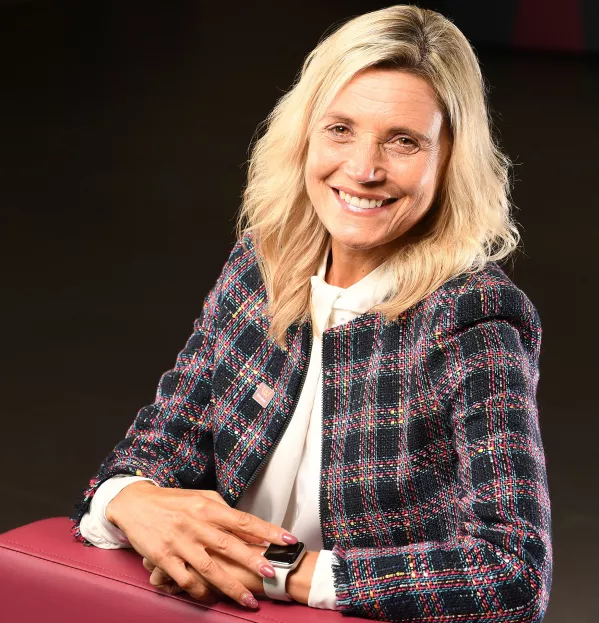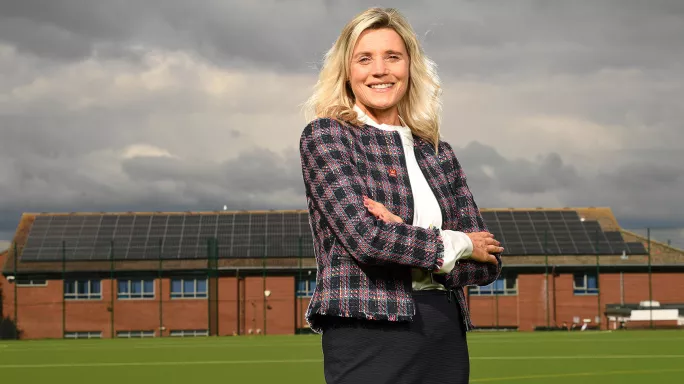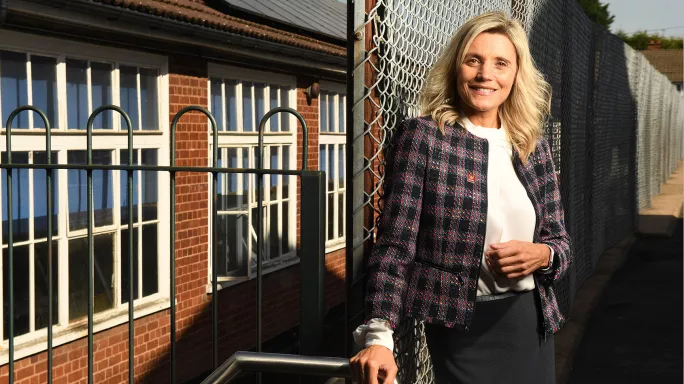- Home
- Leadership
- Strategy
- 10 questions with... Dawn Haywood
10 questions with... Dawn Haywood

Dawn Haywood is the chief executive of the Windsor Academy Trust and is one of the MAT leaders supporting an inquiry being carried out by the Confederation of School Trusts into how academy trusts raise standards.
Speaking to Tes, she reveals that the impact of one teacher sparked her desire to work in education and why she believes one of most important aspects of school life is for staff to understand why they are doing their job and what their purpose is.
1. Who was your most memorable teacher and why?
As a young person, I had a low sense of self-worth and very few aspirations, questioning whether someone like me, from my background, dared to dream about what the future could hold.
My PE teacher, Mrs Meiring, enabled me to discover my passion and talents - which for me lay in sport - and in doing so helped me to believe that I could be successful and I could transfer success in one area of my life to all areas.
Finding my passion unlocked my purpose. I wanted to do for other young people what she did for me and, aged 11, I decided I was going to become a teacher.
So Mrs Meiring transformed my life. She is the reason that I have always believed that teaching and being an educator is the most important profession in the world - because we transform lives.
2. What were the best and worst things about your time in school?
Throughout my time at primary school, I carried a feeling that the other children had more than me and in some way were therefore better than me. My expectations of myself were low and I lived this out in how well I did.
I never want any child to feel about themselves the way I did at that age. At the Chantry High School in Worcestershire, an 11-16 comprehensive school, I started to thrive and flourish.
It was a school that invested as much in our passions and talents as it did in what we were learning academically. It was a school where the leaders and staff understood the interdependence of unlocking both personal and academic potential. It has really shaped a lot of my views as an educator today.
3. Why do you work in education now?
I had a moment where I was in the school changing rooms at lunchtime having done an extracurricular club and I simply remember thinking: “If one person [Mrs Meiring] can make this much difference to my life, I want to do this for other kids.”
The reason I work in education is because of that burning fire inside of me that will never be extinguished. I was determined to make as much of a difference as she made for me - especially for less advantaged young people, who might need adults to see things in them before they see it in themselves. And that is why I do what I do and will always be why I do what I do.
4. What are you most proud of in your career and what do you most regret?

The thing I am most proud of is leading the Windsor Academy Trust family. I am exceptionally proud of our 1,000 staff, the nine schools that we have and the 7,000 children that we serve.
Of course, we can always do things better, but I think we are doing the right thing for the right reasons, and we are genuinely making a difference to young people’s lives and helping to shape and influence the system with the best intentions.
There are many things I would certainly do differently if I could redo them. I have no regrets but just many lessons learned that have helped me to reflect and to grow as a leader. It has all helped me to learn the importance of resilience, the importance of self-awareness and being brutally honest with oneself and the importance of striving every day to be a little bit better.
5. If you could choose your perfect staffroom, who would be in it?
That is an easy one: the staff we have already got in our staffrooms.
They know who they are as educators, they know why they are doing what they are doing and care deeply. I want staff in our staffrooms who are empowered and strive to become even better - as Dylan Wiliam says, “not because they are not good enough, but because they can be even better.”
6. What do you think are the best and worst aspects of our school system?
The best aspect of our education system is the potential to create the best education system in the world because we are able to get better through the collaborative power of school trusts. We have the opportunity through strong trusts who work collaboratively locally in cities, boroughs and counties to create an education system that serves the best interests of all young people in those localities, and that influences the whole education system.
7. Your own teachers aside, who in education has influenced you the most?
Without question, Baroness Sue Campbell. Sue is now director of women’s football at the Football Association and has overseen the huge success of the Lionesses. As chair of UK Sport, Sue oversaw the transformation of the fortunes of Team GB at the Olympic and Paralympic Games, reaching third on the medal table in London 2012.
At the tender age of 26, I came across Baroness Campbell, who at the time was the chief executive of the Youth Sport Trust (YST), which had a government contract at the time to support specialist sports colleges and the School Sport Partnership network.
I was totally inspired by who she was as a leader. I made the decision to join the YST to work with Sue and to join the movement to use the power of sports to transform lives and schools. Sue is one of the most talented leaders I have ever had the privilege to meet and she is also a wonderful human being, with whom I still stay in touch today.
She taught me that everything starts with understanding our “why” before we move on to what we do and how we do it. It is knowing our purpose and relentlessly pursuing it that unlocks success.

8. If you became education secretary tomorrow, what would you change?
I would create an education policy that is focused on eliminating inequality and on a broader definition of young people thriving now and in the future. One of the terrifying realities is the increasing number of young people finding themselves in absolute poverty. Although incredibly complex, I would endeavour to tackle that. We need to create young people who are generation-turners.
By enabling young people to become more than they ever thought they could be, we will break that cycle of poverty for their children in the future.
Education policy should enable the empowerment of young people as learners, ensure schools play a strong civic role in their communities, and focus on driving sustainability and net zero so our children have a world and are empowered to live in a way that promotes thriving.
9. What will our schools be like in 30 years?
I am an eternal optimist who always believes we can create a hopeful future. In 30 years’ time, I see schools in which young people are empowered, self-regulating, and with high metacognition. Young people who are able to pass tests and exams, but young people who are inspired to learn and know how to learn, solve problems and overcome obstacles for the rest of their lives.
Schools in the future will brilliantly harness the power of digital technology and have also worked out how we reduce the harm of social media with digital technology in every child’s hands.
I think schools and school trusts in 30 years’ time will play crucial, intentional roles with other civic actors within their communities to not just transform what happens for children inside schools, but also to help to transform the communities themselves.
10. What one person do you think has made the most difference to our schools over the past year?
I would say Leora Cruddas from the Confederation of School Trusts. I think Leora is doing a stunning job. She is really listening, she is very humble and she pushes us and leads us to focus on the things that build strong trusts, have a civic impact and make a system contribution.
I believe Leora is a talented influencer across political colours because she is focused on doing the right thing for education, for communities and for society. When you genuinely listen, as she has been, and then you influence and shape policy based on what is happening in education, and provide a powerful narrative of a hopeful future, that is where magic happens.
Register with Tes and you can read two free articles every month plus you'll have access to our range of award-winning newsletters.
Keep reading with our special offer!
You’ve reached your limit of free articles this month.
- Unlimited access to all Tes magazine content
- Save your favourite articles and gift them to your colleagues
- Exclusive subscriber-only stories
- Over 200,000 archived articles
- Unlimited access to all Tes magazine content
- Save your favourite articles and gift them to your colleagues
- Exclusive subscriber-only stories
- Over 200,000 archived articles



